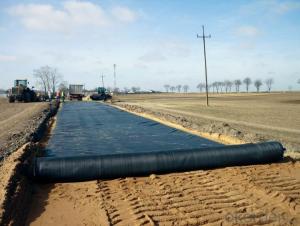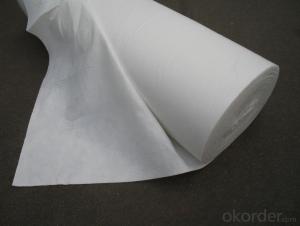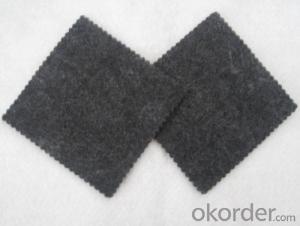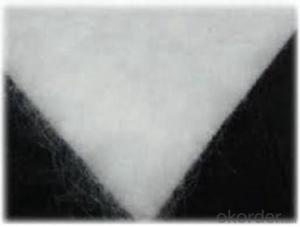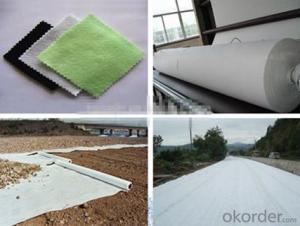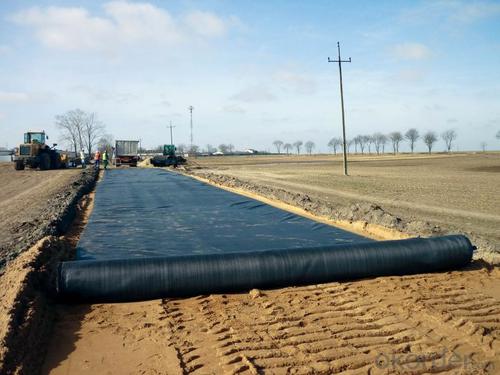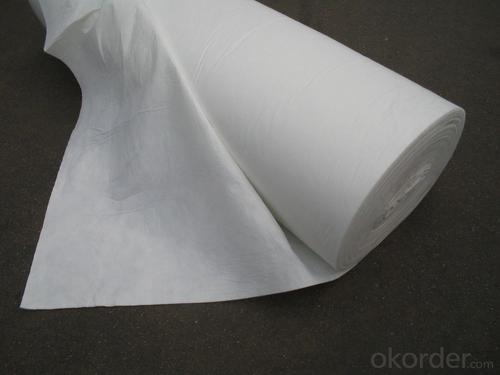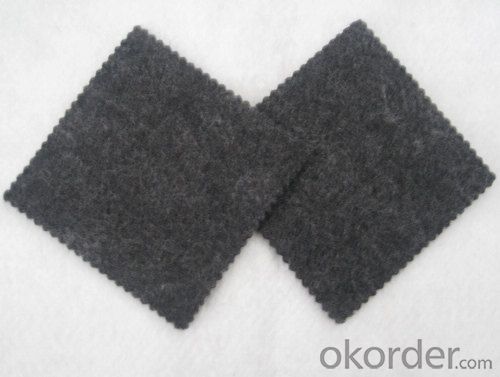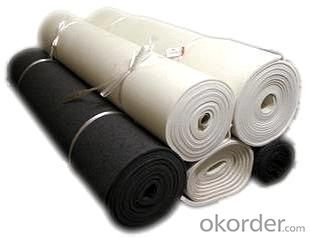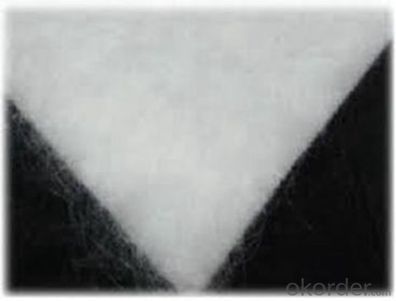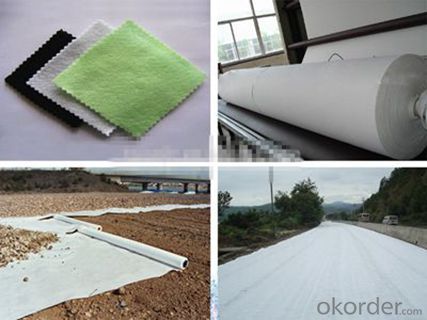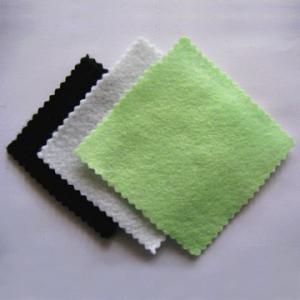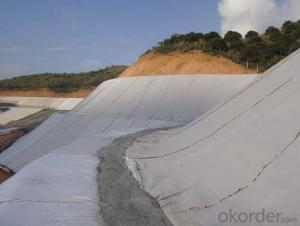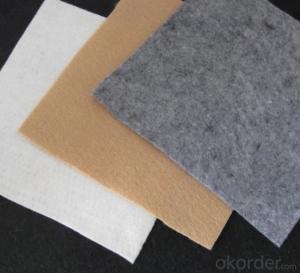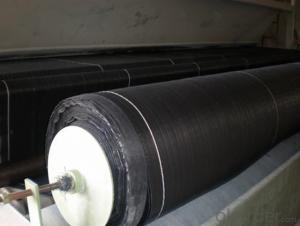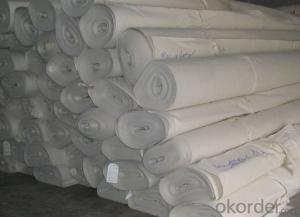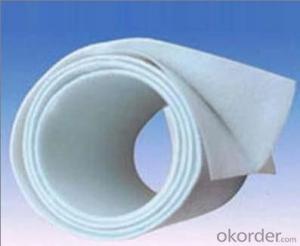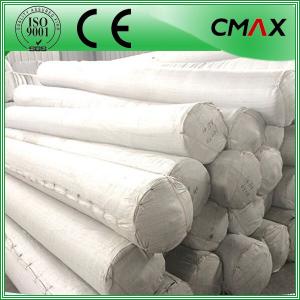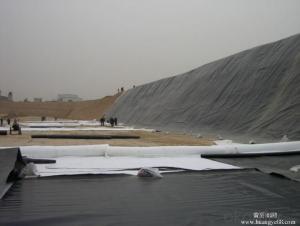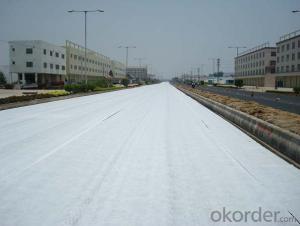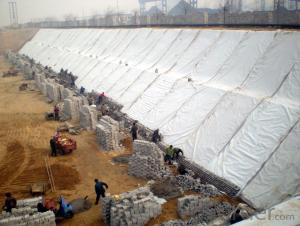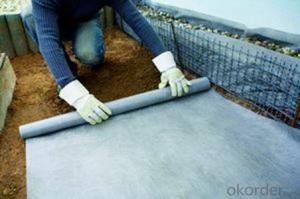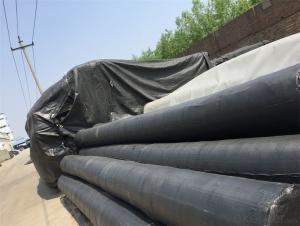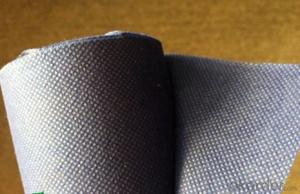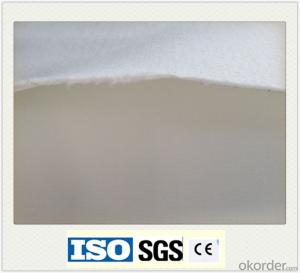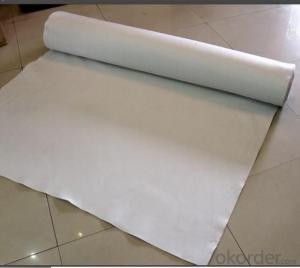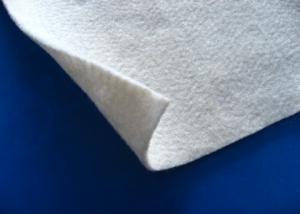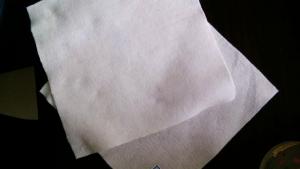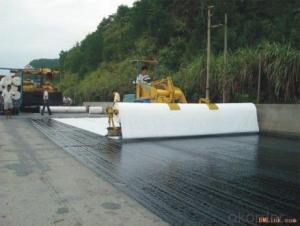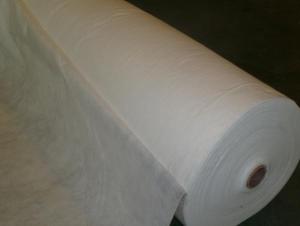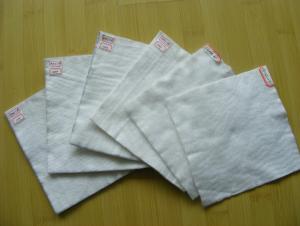Geotextile Clay Liner Short Non-Woven Geotextile PP&PET Non-Woven Fabric Roll
- Loading Port:
- China main port
- Payment Terms:
- TT OR LC
- Min Order Qty:
- 4000 m²
- Supply Capability:
- 1000000 m²/month
OKorder Service Pledge
OKorder Financial Service
You Might Also Like
Specification
Product introduction:
1.high quality geotextiles
2.CE, ISO9001, ISO14001
3 Sample available
4. 100-800g/m2
1).Reinforcement: Used in the constructions of highway, railway, airport, dam, prevent slope dike, retaining wall, etc. to improve stability.
2).Protection: To prevent the bank from eroding by wind, wave ,tidal and rain. Used for the projects such as revetment, slope protection and bottom protection, anti-soil erosion,etc.
3).Filtration: Used as filtering layer of dike, the dam, river and coast stone , slope, retaining wall to prevent sand grain through and allow freedom through of air or water
pet long fiber woven geotextile takes the polyester fiber as th e primary material. After blooms in the pine, to comb, disorderly, craft productions and so on shop net, acupuncture to become.
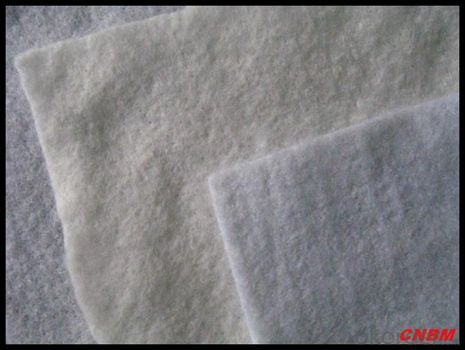
Function
The main function of these geotextiles is to offer separation, filtration and primarily protection,
• Separation and stabilization in road and railway construction
• Prevention of soil movement in erosion control measures
• Cushioning and protection in many containment projects.
Packaging & Shipping
Packing: PLASTIC FILM INSIDE, AND WOVEN BAG OUTSIDE
Shipping: About 15 days after receipt the deposit
geotextile fabric
permeability,filtration,easy for construction
ISO and CE certificate
Good quality and competitive price
Our Service
Quality assurance
1.On a regular basis or as per your request,we entrust national testing agencies to conduct quality inspections
2. Strictly in accordance with the ISO9001-2008 international quality system standard,we monitor and manage the whole process throughout production,quality testing,and measurement to ensure product quality
3. For quality-related construction delay or substandard construction(except for damage or losses due to customer’s responsibility or irresistible natural disasters),we have refunding,replacement,and repair services.We will respond to customers’ feedbacks on quality issues within 24 hours.
FAQ:
Q: What kind of payments does jenor support?
A: T/T, L/C, Cash are accepted.
Q: Do you charge for the samples?
A: Accordeing to our company policy, the samples are free, we only charge the freight fee. And we will return the freight fee during the next order.
Q: Can you produce according to customers' design?
A: Sure, we are professional manufacturer, OEM and ODM are both welcome.
Q: Do you have other products?
A: Yes, please check the pictures:
- Q: Water board and water pipes and quick overburden trees
- Set aside the road to pull the car, little by little to fill the soil, I am specializing in the production of geotextile, drainage board, wish smooth
- Q: Can plant roots penetrate geotextiles? Which kind of similar material can keep soil and water and let the plant roots pass through it?
- Of course. The roots of plants are omnipotent, and it has a strong vitality. It is small, but its power is infinite. It is also because it is small, it makes it seamless no omnipotent. It can wear the river across the sea, it can wear stone to break the ground, it is powerful you can not imagine, you do not see the cliffs on the grass, the king did not see the plow of the fern leaves!
- Q: The amount of geotextile drainage of the drainage pipe, as well as the amount of gravel block ye count
- Calculate the surface area of the water pipe, and then add a 10% of the amount, is the amount of geotextile, Huazhi geotextile material manufacturers to answer
- Q: What are the key considerations for geotextile installation in cold climates?
- There are several key considerations for geotextile installation in cold climates. First, it is important to choose a geotextile material that is specifically designed for cold weather conditions. This ensures that the material will not become brittle or easily damaged in freezing temperatures. Additionally, proper site preparation is crucial, including removing snow and ice from the installation area to ensure a stable base for the geotextile. It is also important to properly anchor the geotextile to prevent shifting or movement due to freeze-thaw cycles. Overall, careful selection of materials and proper installation techniques are essential for successful geotextile installation in cold climates.
- Q: What are the design considerations for geotextile applications?
- Some design considerations for geotextile applications include the type and weight of the geotextile material, the strength and durability requirements, the expected level of permeability, the ability to withstand environmental conditions such as UV exposure or chemical exposure, and the compatibility with other materials used in the project. Additionally, factors such as installation methods, load distribution, and long-term maintenance should also be taken into account during the design process.
- Q: Are geotextiles suitable for use in reservoir lining?
- Yes, geotextiles are suitable for use in reservoir lining. They can effectively prevent erosion and provide stability to the reservoir walls, while also allowing water to drain through. Additionally, geotextiles are durable and resistant to various environmental conditions, making them a reliable choice for reservoir lining.
- Q: How do geotextiles help in gas venting?
- Geotextiles help in gas venting by allowing the passage of gases through their permeable structure. They act as a barrier but still permit the movement of gases, such as methane, from the ground to the atmosphere, preventing the accumulation of potentially harmful gases below the surface.
- Q: How do geotextiles improve the performance of foundations?
- Geotextiles improve the performance of foundations by providing separation, filtration, and reinforcement functions. They prevent the mixing of different soil layers, allowing for better load distribution and reducing the risk of settlement. Geotextiles also act as filters, allowing water to pass through while retaining soil particles, which prevents clogging and maintains the stability of the foundation. Additionally, geotextiles reinforce the soil, increasing its strength and enhancing the overall stability and load-bearing capacity of the foundation.
- Q: Geotextile business how to run
- Geotextile as a geotextile material, engineering applications have been very popular, the market competition is also very intense. Profits have been very low Bulk geotextile transactions are mainly ordered in the form of tender, so please pay attention to bidding information, I wish you success.
- Q: Production of acupuncture carpets, geotextiles, warm flakes, paper blankets, air filter materials, the main raw material is what? why?
- Fiber, like eating bread must be the same with the face
Send your message to us
Geotextile Clay Liner Short Non-Woven Geotextile PP&PET Non-Woven Fabric Roll
- Loading Port:
- China main port
- Payment Terms:
- TT OR LC
- Min Order Qty:
- 4000 m²
- Supply Capability:
- 1000000 m²/month
OKorder Service Pledge
OKorder Financial Service
Similar products
Hot products
Hot Searches
Related keywords
